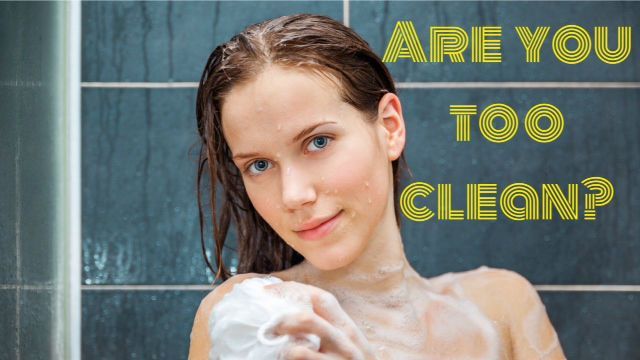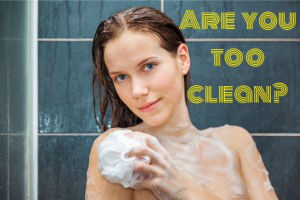
We all know that good hygiene is crucial to good health – if we do not clean our hands, bodies and homes, we invite all sorts of pathogens to multiply, which could easily lead to serious illness. However, some of us take it too far.
Constantly washing our hands, showering multiple times per day, sanitizing surfaces with antibacterial cleaners and making sure everything is spotless are not uncommon habits. Many public places these days have dispensers of antibacterial gel readily displayed in convenient dispensers, so we can quickly disinfect at all times.
Is our obsession with cleanliness actually healthy, or could it actually be causing harm?
A new study published in the Journal of Allergy and Clinical Immunology found that babies who had been exposed to common allergens such as pet dander and roach allergens, as well as common household bacteria, before the age of one were less likely to develop wheezing, asthma and allergies, compared to children that had not been exposed to these substances before age one.
According to the CDC, asthma affects approximately 7 million US children, and is one of the most common childhood illnesses.
The researchers also found that if a child was initially exposed to common allergens and household bacteria after the age of one, protective benefits against asthma and allergies were not observed. Study author Dr. Robert Wood of the Johns Hopkins Children’s Center states:
“Our study shows that the timing of initial exposure may be critical. What this tells us is that not only are many of our immune responses shaped in the first year of life, but also that certain bacteria and allergens play an important role in stimulating and training the immune system to behave a certain way.”
This is not the first study to find that getting dirty may help to prevent the development of asthma and allergies in children. A 2012 study, also published in the Journal of Allergy and Clinical Immunology, found that Amish children raised on farms had lower rates of asthma and allergies than their peers. Researchers hypothesized that this was due to their repeated exposure to the microorganisms found in farm soil.
Our immune systems learn from experience. When we encounter specific germs, especially at a young age, our immune systems become trained to distinguish between benign and dangerous substances, and learn to respond accordingly.
Dr. Samuel Friedlander, an allergist at University Hospitals Case Medical Center, says: “I believe that the immune system is like an army… if the army doesn’t have something to fight like microbes, it’s going to fight things like allergens in many cases. People [who] live on farms are exposed to more microbes and as a result the immune system tries to fight those bugs and then, in turn, the body doesn’t have to fight allergens.”
While this immune-training effect of dirt and germ exposure is especially pronounced in childhood, some research has found that it may be possible even for adults to “reset” their immune systems through exposure to certain microorganisms. This highlights the body’s amazing ability to learn and adapt in order to protect itself; what doesn’t kill us really can make us stronger.
Washing your hands and body too often is also detrimental in that it removes our skin’s natural layer of healthy oils, which function to defend the body against microscopic invaders. If you are washing your hands to the point where they crack, for example, it gives germs a gateway to easily enter your body.
Antibacterial soaps – the worst offenders
While over-washing with regular soap is bad enough, many of us lather up daily with antibacterial soaps and scrubs, and clean our homes with antibacterial cleaning agents. The principal ingredient in these products is a chemical known as triclosan, which was originally introduced as a pesticide in the 1960s, and is still used in pesticide applications today.
Along with its pesticide function, triclosan appears in about 75 percent of all soaps, toothpastes and deodorants sold in the US. The dangers of this chemical are becoming more widely known; it is linked to estrogen disruption, has been associated with encouraging an earlier onset of puberty, and can accumulate in fat tissues. It has been found in human blood, breast milk and urine samples.
When triclosan comes in contact with chlorine, such as from chlorinated tap water, it forms chloroform gas, which is classified by the EPA as a “probable human carcinogen.” It is also hazardous to the environment, as it has been found to accumulate in lake sediment.
Perhaps the most pronounced danger of triclosan, however, is that it is thought by many experts to be contributing to antibiotic resistant pathogens. For all of these reasons, the manufacture and commerce of products containing this substance was banned earlier this summer in Minnesota (https://www.thealternativedaily.com/minnesota-bans-antibacterial-soap-ingredient/). This important ban will hopefully set a precedent for other states.
To add insult to injury, studies have found that just plain soap and water is as effective at preventing communicable illnesses as antibacterial soap.
Leading health expert Dr. Joseph Mercola aptly summarizes: “While disinfectants are extremely useful in a hospital setting, they can do far more harm than good when used on a daily basis in your home.”
 Keep it clean – but not too clean
Keep it clean – but not too clean
Washing our hands with soap and water when needed – after using the restroom, blowing your nose, after cooking and before eating, for example – and practicing good personal hygiene are important. Too much cleanliness, however, can be detrimental to your immune system. Use common sense and remember not to go overboard.
Toss the antibacterial hand gel and antibacterial household products, and instead wash with a mild, organic soap, and consider switching to natural cleaners for use around your home, which besides triclosan contain an array of potentially harmful chemicals.
To enjoy the best protection against disease possible, gear your lifestyle towards building and maintaining a strong immune system. Eat a diet of whole, nutritious foods, including probiotic foods like yogurt, kefir and sauerkraut, get plenty of exercise – out in the sunshine and fresh air as often as you can – manage your stress levels, and get plenty of good sleep at night. A healthy lifestyle will give your body the best chance to overcome whatever pathogens come your way.
Bottom line: let the kids play in the dirt, and don’t forget to play in the dirt yourself!
-The Alternative Daily
Sources:
http://www.hopkinsmedicine.org/news/media/releases/newborns_exposed_to_dirt_dander_and_germs_may_have_lower_allergy_and_asthma_risk
http://articles.mercola.com/sites/articles/archive/2011/07/27/how-washing-your-hands-and-germophobia-can-damage-your-brain.aspx
http://www.nbcnews.com/news/other/it-possible-be-too-clean-researchers-say-yes-f1C6345427
http://www.jacionline.org/article/S0091-6749%2812%2900519-2/fulltext
http://www.marksdailyapple.com/immune-system-strength/#axzz37g4DtMDj
https://www.thealternativedaily.com/minnesota-bans-antibacterial-soap-ingredient
https://www.thealternativedaily.com/3-reasons-to-stop-using-conventional-cleaners

